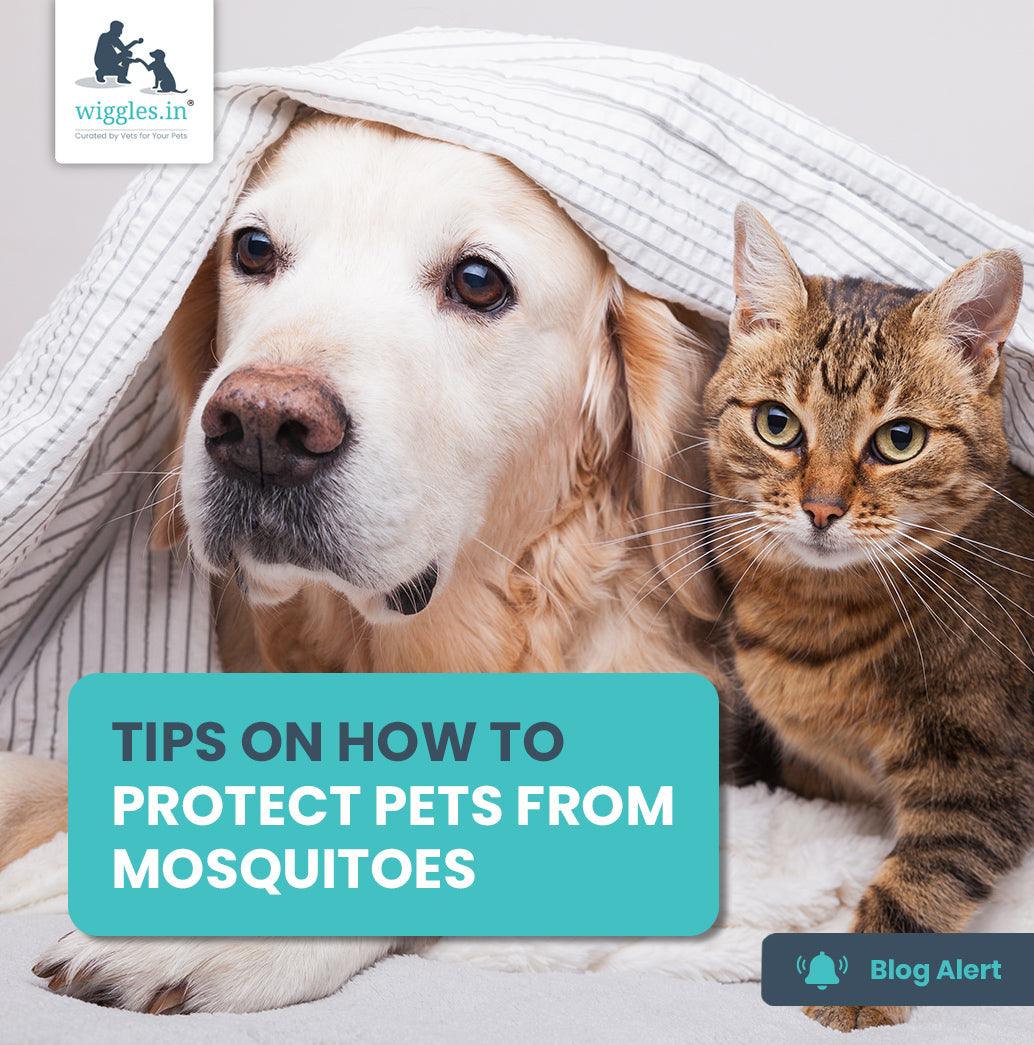The onset of monsoon brings relief from the scorching heat & churns out tea and pakoras in Indian households. But it is not only us who enjoy the drizzle. Our pets may not enjoy a bath but a good spell of rain definitely piques their interest!
But along with rain, there are a few uninvited guests who arrive at our doorstep too. These guests are fungal infections, ticks & indigestion. And as pet parents, we try & protect our pets from them to the best of our abilities. But did you know, our pets are also vulnerable to mosquito bites?
As it turns out, we humans are not the only ones affected by the constant buzzing & bites. Our pets are also prone to mosquito bites & if not taken care of, it can have grave consequences.
Do mosquitoes bite our pets?
Yes. Mosquitoes are inherently mammal seekers which means that they feed on warm-blooded beings. That includes humans and their pets as well. Therefore, the answer is yes. Mosquitoes also bite our pets.
How can mosquito bites affect our pets?
Although both humans & pets are at equal risk of mosquito bites, our pets face a serious threat of infection transmitted through mosquito bites. The biggest threat to our pets from mosquito bites is “Heartworms.”
What is Heartworm?
Also known as Dirofilaria immitis, it is a parasitic roundworm that has a thread-like appearance. Heartworm disease in pets can be deadly. It can cause extensive damage to the lungs, heart, organ failure & in some cases, even deaths. These worms spread through a simple mosquito bite. The chain of infection involves hosts such as the mosquito & our pets. The chain works in the following manner -
Mosquito bites an infected pet/animal
↓
The mosquito becomes an intermediate host for the worm
↓
The mosquito bites another pet/animal
↓
The larvae get transferred into the bloodstream of the pet who effectively becomes a host for the parasite worm.
Once the worm has entered the bloodstream, the pet becomes the definitive host for it. The larvae will migrate to the heart and mature there into adult worms which will mate, lay eggs, and produce offspring (microfilariae). These microfilariae will be soon found in the pet's bloodstream. The parasite will survive by feeding on the definitive host i.e. our pet.
What is the life cycle of a Heartworm inside a pet?
When a dog is bitten by an infected mosquito, it takes around 6 to 7 months for the larvae to mature into adult heartworm. Once maturity is attained, the adult heartworms mate, and the offspring are released into the bloodstream which eventually completes the life cycle.
Once inside the dog, heartworms can survive from 5 to 7 years on average. The male heartworm can measure from 4 to 6 inches in length while the female heartworm can attain a length of 10 to 12 inches. The number of worms living inside a pet can vary and is known as “worm burden.” The average worm burden is about 15 but it can vary from 1 to 250.
While in cats, the situation is a bit different. The average lifespan in a cat is between 2 to 4 years. The worms rarely mature into adults and a cat’s body can have 1 to 2 worms at max. But since cats are smaller in size, even this amount can be deadly. Also, it can be a difficult exercise to identify heartworms in cats as compared to dogs.
Is Heartworm contagious?
No. Unlike many other diseases (like kennel cough & parvovirus) heartworm is not contagious as it only spreads through an infected mosquito bite through the bloodstream.
What are the symptoms of Heartworms?
The symptoms may differ in pets depending upon the severity of the infection. Based on it, there are several categories of symptoms. Higher the category, the worse the infection.
Category 1: No symptoms showed or mild symptoms like an occasional cough.
Category 2: Mild to moderate symptoms like coughing, lethargy, and tiredness after a workout.
Category 3: Severe symptoms like weak-looking appearance, regular coughing, lethargy, exhaustion after a mild workout. Breathlessness & signs of heart failure.
Category 4: This category is the most severe. The worm burden is so heavy that it starts affecting the blood flow to the heart as the path is blocked by a bunch of worms.
The 4th stage is also known as “Caval Syndrome.” It is life-threatening and requires urgent surgery. But even with surgery, the chances of survival are bleak. Therefore in these cases, prevention is better than cure.
How to protect our pets?
- Some pet-friendly mosquito repellants can be used to repel mosquitoes. They usually come in a spray form and need to be re-applied. Consult your vet for the same.
- Try & avoid walks during peak hours when mosquitoes are most active. For example, walks during the evening should be planned in a manner that your pet can avoid contact with mosquitoes.
- Pets can also be dressed in pet-friendly clothing to limit their exposure to mosquitoes.
- Avoid areas with stagnant water & also keep your vicinity water-free. Stagnant water is the prime source of mosquitoes. Empty house plant containers of water.
- Another effective way is to use essential oils like lemongrass, eucalyptus which are effective in repelling mosquitoes from your pet’s coat. Pet Sanitizers also have insect-repelling properties as they include essential oils such as lemongrass and holy basil which act as strong insect repellents.
- Another DIY can be to use citrus items like lemon. Simply boil a few slices and let it steep. Once it cools down, you can fill a spray bottle and spray it across your pet’s body to keep the mosquitoes away.
- Consult your vet for any possible treatments, vaccinations, etc to ensure that your pet is fully protected against the disease.
To diagnose heartworms, pets need to be tested by vets. Make sure you notice these signs & symptoms as early as possible and approach your nearest vet for medications. For any other pet-related medical help, contact us on +91 8431620000.
© Wiggles.in



















